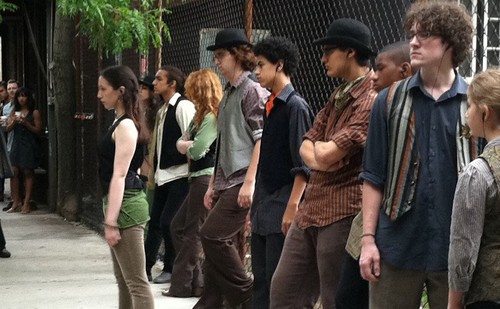Zen Anton Paultre is a senior company member at Downtown Art, where he has been an actor, playwright and musician for the past four years. He is a teen.
 |
| Zen Anton Pautre, left; Oscar Hallas, right |
I'd like to first of all say that no, the basis of my argument is not the played out phrase "But don't you remember when you were that age?" That phrase is for the uninventive teenager to say when in trouble and the unoriginal adult to use as a defense when taking up the uninventive teenager's plight with the parents. Instead, the subjects I'd like to touch upon are such as music, deep inner emotions of the soul, and technology. Shall we begin?
Music. The thing that makes our pulse pound, makes our feet move, and sometimes even makes us start riots. Needless to say there's a lot of simply terrible music out there and the majority of today's youth eat it up, without thinking of the consequences, just like that chubby kid in Starbucks who thinks to him/herself "Oh, just having one caramel-mocha frappuccino won't kill me." Sure, once and a while it won't kill you, but eventually that arm fat will sag so low that people will wonder if indeed they are trying to grow wings and fly away. Just like the aforementioned chubby kid, all these young kids today are drinking down far too many doses of caramel-mocha-emotionless-bland-overly-produced-excuses-for-music-frappuccinos. As a member of "The Youth" I find it sad to see so many of my own kind wow'ed and impressed by the white noise they choose to sing along to and quote lyrics from with such strong conviction.
You may be wondering to your self something along the lines of "Well, even as this information is all completely accurate, what does it have to do with the similarities between Adults and Teenagers?" To answer your question, it has everything to do with the similarities. Have you not seen the amount of adults also singing along to the "popular" music of today? Singing along as if they connect to the lyrics that the musician didn't even write themselves? You see, adults and teenagers have an almost equal amount of tasteless music listeners. Adults and teenagers both have members of their societies who are trying desperately to connect to something.. To feel like part of a group… To try and maybe feel not so alone…. And so they take refuge in music. This is all well and good until it goes too far.
Categories such as Goth, Emo, and Hipster have often been associated with being a young person thing because we have all that "teenage angst" pent up inside of us. This is true for a lot of cases but just as many adults have that same angst and are Goth, Emo, and worst of all Hipsters. And just as many adults are still trying to find themselves and find where they fit into the world. Some even take trips to far away countries in hopes that a magical epiphany will hit them and explain the reason all their friends are moving on in life and why on earth they can't find a date who just so happens to be "the one."
Does that remind you of that time a friend of yours kept you up all night Facebook chatting about their Deep Inner Emotions and you nearly bit your computer out of sheer boredom? It sure does remind me of that time...
This in turn brings us to the last topic of today, Technology. It has long been the argument that one of the main differences between The Youth and the Old Folk are the gizmos and gadgets. This argument seems to steadily become less and less valid. I mean, sure, 75% of us teens are addicted to Facebook and texting but at least 50% percent of the adults in this world are also addicted to the same thing. Feeling the need to constantly update the world on every little minuscule thing they do in the day. Seriously, does anyone really care about you enough that they need to know you just bought some milk? It's a vice that everyone has fallen into.
In this day and age narcissism is at an all time high. Teenagers may be the ones who are more outwardly obnoxious with this vice, but it is safe to say that everyone has been affected. As much as it is painful to admit, you adult readers must recognize that teenagers are your not too distant cousins after all.
-Zen Anton Paultre
P.S. The use of big words throughout this blog was to not to be annoyingly pretentious but to prove that not all teens have lost their vocabulary from all the texting.













